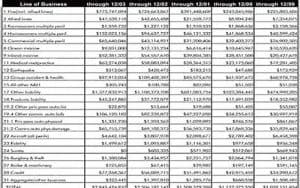Insurance Grouping for Cars: Everything You Need to Know
What is Insurance Grouping for Cars?
If you are in the market to buy a new car, you may have heard the term “insurance grouping.” This refers to the system used by insurance companies to categorize cars based on their risk of being involved in an accident or being stolen. The group a car falls into will have a direct impact on the cost of its insurance. Understanding how insurance grouping works could save you money on your car insurance premiums.
How is Insurance Grouping Determined?
Insurance groups are determined by a number of factors, including:
- The cost of the car when it was new
- The cost of replacement parts and repair costs
- The car’s performance, including its acceleration, top speed, and handling
- The car’s safety features, such as airbags, anti-lock brakes, and electronic stability control
- The car’s security features, such as alarms, immobilizers, and tracking devices
All of these factors are used to calculate the risk of insuring a particular car. Cars that are more expensive or have higher performance ratings are generally seen as higher risk, and thus are placed in higher insurance groups.
How Many Insurance Groups are There?
Insurance groups range from 1 to 50, with lower numbers indicating lower risk and thus lower insurance premiums. Group 1 cars are the cheapest to insure, while group 50 cars are the most expensive. Most cars fall somewhere in the middle, with groups 10-20 being the most common.
How Can I Find Out What Insurance Group my Car is In?
You can find out what insurance group your car is in by using the insurance industry’s online calculator. Alternatively, you can check with your insurance company directly.
Can I Lower my Insurance Group?
You cannot directly change your car’s insurance group, but there are things you can do to lower your premiums, such as:
- Installing additional security features, such as a steering wheel lock or a tracking device
- Taking an advanced driving course to demonstrate your driving skills and improve your safety record
- Increasing your voluntary excess, meaning you agree to pay more out-of-pocket in the event of a claim
What Should I Consider When Buying a Car Based on its Insurance Group?
When buying a car, you should consider its insurance group as well as its purchase price, running costs, and resale value. A car with a low insurance group will generally be cheaper to insure, but it may not be the best car for you if it does not meet your other requirements, such as size, fuel efficiency, or performance.
How Does Insurance Grouping Affect my Car Insurance Premiums?
The insurance group your car falls into will directly impact the cost of your car insurance premiums. Cars in higher insurance groups will generally cost more to insure than cars in lower insurance groups. For example, a car in group 50 may cost £1,000 or more per year to insure, while a car in group 1 may cost just £200-£300 per year.
Do All Insurance Companies Use the Same Insurance Grouping System?
While most insurance companies use the same insurance grouping system, there may be some variations between providers. It’s always a good idea to shop around and compare quotes from different insurance companies to ensure you are getting the best deal.
Conclusion
Insurance grouping for cars is an important factor to consider when buying a new car or renewing your car insurance. By understanding how insurance groups are determined and what factors are taken into account, you can make an informed decision about which car to buy and how to keep your insurance premiums as low as possible. Remember to check your car’s insurance group before purchasing, and consider additional security features or advanced driving courses to reduce your premiums.
At the end of the day, having car insurance is not just a legal requirement but also provides financial protection in case of accidents, theft or other unforeseen circumstances. Make sure you get the right insurance policy and that you understand all the terms and conditions before signing on the dotted line.
FAQs
1. How is insurance grouping calculated?
Insurance grouping is calculated based on the cost of the car, replacement parts, repair costs, performance, safety features, and security features.
2. Can I change my car’s insurance group?
No, you cannot directly change your car’s insurance group, but you can take steps to reduce your premiums.
3. What is the most common insurance group for cars?
Most cars fall into insurance groups 10-20, which are considered average risk.
4. How much can I save by choosing a car in a lower insurance group?
The cost savings will depend on the individual car and the insurance company, but cars in lower insurance groups can be significantly cheaper to insure.
5. What factors affect the cost of car insurance premiums?
The cost of car insurance premiums is affected by a number of factors, including the driver’s age and location, the car’s make and model, the driver’s driving record, and the level of cover required.
6. How do I find out what insurance group my car is in?
You can find out what insurance group your car is in by using the insurance industry’s online calculator or by checking with your insurance company.
7. Why is it important to consider insurance grouping when buying a car?
It’s important to consider insurance grouping when buying a car because it will have a direct impact on the cost of your car insurance premiums. A car in a higher insurance group will generally cost more to insure than one in a lower insurance group.
